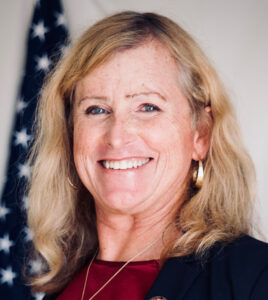District Three
Runoff Question 11: How would you increase city revenues?
Lisa Landau

Revenue increases are not necessarily the best way to accomplish a balanced budget. Excessive revenue-driven growth, such as redundant strip malls and other retail, only sometimes makes communities more livable and sustainable. Measure BB was passed four years ago, which increased revenues with a half percent sales tax. It was positioned to offset significant budget cuts to maintain vital City services. The proposed tax increase was projected to raise approximately $5 million per year and cover essential city services. Today the financial situation in Seal Beach is the same.
With that said, I would ask for a full audit to see the revenues and spending for Seal Beach in 2022 and projected for 2023.
Armed with current data from the full audit, I would recommend spending limits and reductions to achieve a balanced budget.
A vibrant and energized community attracts visitors who want to spend time and money in our town. Small businesses and entrepreneurs are the fabric of Seal Beach Main Street and need to be highlighted as unique, innovative, safe, and memorable. Successful businesses bring more sales tax.
I would support continual improvements to the policies and programs that make our city beautiful, safe, livable, sustainable, and accessible. These qualities of our city attract new residents, keep our property values high and sustain successful businesses and, therefore, revenues. Higher property values are good not only for residents but for the increased property tax it brings to the city. Let’s concentrate on making Seal Beach the best it can be, and the revenues will follow.
Finally, as parking continues to be an ongoing issue in Seal Beach, a Public/Private partnership may be what we need to increase revenues while helping to solve parking issues.
Stephanie Wade

First, it’s important to protect the resource base we already have. To the extent that the city has influence over the housing market, we want to help keep home prices (and real estate taxes) stable by maintaining Seal Beach’s family-friendly culture.
Second, we should partner more closely with local restaurants, retail and service businesses. They not only provide great local amenities, but also contributed $5 million in city sales tax last year. A small business-friendly climate will help our businesses grow, even as they face inflationary headwinds. Programs like the Fish Fry, Car Show, movie nights, the Seal Beach Symphony, Run Seal Beach and holiday observances in Eisenhower Park can be profitable for small businesses and our city government.
We should also consider bringing back the sand castle contest and kite festivals. When we put on smart, well planned events we all have fun, keep our money at home and our neighbors visit and contribute to our local economy.
Next, I will advocate for our city to hire a full time grant writer. With direction from the Council and the City Manager, this role can pay for itself many times over by helping our small city access the non-profit, county, state, and federal funds we need and deserve. Our first priority should be to research federal funds available through the Inflation Reduction Act (IRA) funds. The IRA appropriated $379 billion much of for specifically designed to support state and local efforts to address the effects of climate change like flooding, storm surge and beach erosion. The $1.2 trillion dollars in the Bipartisan Infrastructure Bill passed last year has similar provisions. I will push our city to aggressively apply for these and other monies and hiring a grant writer is the first and most important step.
Finally, and regrettably, I will consider and if necessary support financing our most pressing priorities, like the McGaugh Pool renovation and the construction of a new Lifeguard Headquarters Building–with a municipal bond. While debt financing is always a last resort, the state of our deferred maintenance may require us to do so. Because our city finances are stable and about to improve in FY 2023-24 when we pay off the bond on Fire Station #2, we have the ability to do this at relatively low cost. And having learned from these experiences I know we can be more prudent in the future.
Runoff Question 12: How would you reduce city costs?
Lisa Landau
Personnel costs are usually the costliest part of a budget. An audit of what jobs are outsourced and what is done in-house is imperative. It is also important to know if the positions filled are essential to providing the service our town needs.
My experience in business and accounting has taught me to judge any spending by the value we receive for it. That means finding alternatives for, or even eliminating, low-value spending.
That is where my community involvement plan is helpful. I will hold town hall meetings and chat times regularly to know what District 3 wants in service. District 3 has many families and children, so our needs may differ compared to other Districts. The only way to know what District 3 residents and businesses want is to ask and listen.
When we have a problem that requires spending, we must first identify a low-cost solution that will solve the problem effectively and sustainably. All spending needs to benefit the residents and businesses of Seal Beach.
As your councilmember I will:
I will direct staff to provide a thorough analysis of each labor position and associated labor costs and determine whether in-house or outsourcing is an opportunity to cut costs.
I will sit with the Finance Director and City Manager months in advance of finalizing the budget to assess what can be trimmed early on before the budget is set.
We will carefully examine how our cars and trucks are used and curtail unnecessary usage.
As an accountant, I am uniquely qualified to analyze expenditures, including labor and benefits costs, and do it in a sound and concise manner. These decisions will be made so the City can put its financial house in order. This professional approach will allow for future growth in key areas of the City so that revenue streams are increased as we tighten our belt to ensure efficiency.
Stephanie Wade
Our budget is already pretty lean. It has to be. We are a primarily residential city with a small business sector and with more than a third of our population living in low income cooperative housing (e.g. Seal Beach Shores and Leisure World) that, under proposition 13, have been protected from increased property tax assessments since 1977. That small tax base will always compel me to look for outside money and to be especially frugal with our own monies.
There are several measures we can undertake to reduce our city’s costs. First, we should reduce our reliance on outside consultants. We’ve spent lavishly on contractors, when our own department leaders are experts in their fields.
Also, let’s learn from our neighbors. Many neighboring cities with similar populations enjoy greater resources. We should examine their practices to see if there’s anything we can apply to Seal Beach – or share with them.
Finally, we must be better about addressing long term maintenance and infrastructure needs in a timely and prudent way. In at least two instances we’ve prevaricated, with a penny wise but pound foolish approach to long term needs: In the case of the McGaugh pool we spent nearly 15 years and tens of thousands in consulting fees during which time the renovation cost has nearly tripled; and in the case of our 1930s-era Lifeguard Headquarters building we engaged in ill advised renovations in the 1960s, 1970s and, most recently, a mold remediation that has already failed. All this when we knew that we needed a renovated pool and a new lifeguard building. I will fight for sound, sober assessments and action plans. I’ll seek outside grants wherever I can and, where tough spending decisions have to be made, I’ll take them head on with transparency and determination that will save us money in the long run.
Runoff Question 13: The OC Board of Supervisors in December declared racism a public health crisis. Do you agree?
Lisa Landau
The Seal Beach I know is compassionate and inclusive and applies bi-partisan problem-solving. Anyone who describes Seal Beach as racist either doesn’t know us or has an agenda to divide us. Seal Beach has a long history of inviting everyone to come and work side by side to better our town because we are better together.
The OC Board of Supervisors, CDC, American Public Health Association, and others have declared a public health crisis due to Racism. (See footnotes below). So how do we handle these conclusions and proclamations?
We have a choice.
We can use them to feed the politics of division, identifying villains and victims by race while denouncing racism to demonstrate our enlightenment and virtue. We can expand big government programs to “help” the victims, even while those programs fail. These cynical and self-interested drivers for racism declarations make some non-racist people skeptical.
Instead, I propose using the declaration as a “problem statement” and work together to identify root causes and find real solutions. Supervisor Do got it right when he included in the County declaration a review of County policies and programs that are not likely to be inherently racist but may nevertheless result in possible adverse effects on ethnic communities.
So, what can Seal Beach do to support our County’s Declaration? As your representative on City Council, I will help steward the prevention of racism when it is used as a political agenda or as a way to divide our community. At the same time, we can look at City resources and services to ensure they don’t adversely affect racial groups. Through our words and actions, we can demonstrate to ourselves, our neighbors, and our children that racial and ethnic non-prejudice elevates us all. And perhaps, most importantly, we can move forward together from declarations to solutions.
With me as your council member, you can be assured that it is my priority to ferret out any systemic racism or bigotry that might be found in our city government. Seal Beach is inclusive and compassionate and I will bring us together rather than divide us so that we continue to be welcoming to all.
https://voiceofoc.org/wp-content/uploads/2022/12/Proposed-racism-health-crisis-resolution-up-for-OC-supervisors-approval-on-Dec-6-2022.pdf
OC Supervisors: Racism and inequity are ‘public health crisis’
https://www.cnn.com/2022/12/08/us/orange-county-racism-public-health-crisis-reaj/index.html
https://www.cdc.gov/minorityhealth/racism-disparities/impact-of-racism.html
https://www.ncbi.nlm.nih.gov/pmc/articles/PMC7436774/
Stephanie Wade
Like many OC residents, massively disproportionate COVID deaths of black and brown people, the 2020 murder of George Floyd and the renewed wave of anti-Asian hate that was intensified by an American President made me feel ashamed that I had done so little to build a more equitable America. We should all be angry when Asian seniors are beaten up, about repeated instances of police misconduct that stain a noble profession, growing racial antisemitism and the prevalence of historical inequality. We should be angry that our government’s forced separation policy punished immigrants by leaving more than a thousand young children effectively orphaned. It’s not OK that INS manipulated their parents into accepting expedited deportation by promising to quickly reunite them with their children, promises that they still can’t fulfill because they literally lost the children in the system. We can and must live up to the values we profess.
I agreed with the supervisors’ unanimous vote to “apply an equity lens” to policy, to “fight systemic racism and implicit bias” and to “further health, wellness and equity.” I was present when it came before them. I listened to 18 people, all but two of them white, speak against the resolution. I heard them shout profanities and racial epithets. I heard their odd conspiracy theories and claims that trying to reduce well-documented disparities was subjecting white people to reverse racism. I saw them try to shout-down those they disagreed with including Chairman Chaffee, the Director of OC’s Health Care Agency and a Black church elder who wanted to explain why her church supported the resolution. And I listened to Supervisor Andrew Do (R-District 1). He represents Seal Beach and I am proud of how he directly and with civility addressed the bigots in the Chamber that day. Even as a heckler yelled “go back to China,” Do shared his own experiences growing up in Huntington Beach, about de facto segregation, about numerous physical and verbal attacks he has faced because he is Vietnamese-American and about the psychological and physical toll that such racism exacts on its victims. He was unequivocal that the county was taking a just, fair measure. I believe he was right and that those who opposed it were driven by ignorance and hate. But people who want to make their own assessments can watch the video here: https://bit.ly/OCBOSPublicHealthEmerg
Runoff Question 14: How would you address unfunded pension debt?
Lisa Landau
The pension fund needs to be funded. It is no secret that we will be on a weak financial footing unless unfunded liabilities are funded. We must fund all our liabilities, not just pension funds.
I will work closely with our state and federal partners in developing a path to solvency for our pension fund. We will likely require additional commitments in terms of more significant contributions from staff to assist the City in achieving this goal. As the District 3 council representative, I will work closely with experts to evaluate the best possible outcome for our city on all unfunded liabilities. As a professional accountant, my decisions will be in line with sound financial and municipal practices.
Please see my website www.LisaForSealBeach.com for more information.
I ask for your vote for a common sense approach to representing District 3.
Stephanie Wade
The city is making excellent progress in paying down our pension obligations. According to CalPERS, we’ve already contributed approximately 81% of our projected pension obligations to the six CalPERS accounts we maintain. That 81% funding rate is consistent with neighboring cities and better than the 72% at which the overall CalPERS system is funded.
Three of Seal Beach pension funds covering workers hired after January 1, 2013 are fully funded and even running small surpluses. Even the three pre-2013 legacy pension plans are now between 68-78% funded.
I’ll fight to make sure we continue to fulfill our obligations to city employees and retirees, make cost-saving early contributions when we can and, when interest rates fall again, that we consolidate our final pension obligations with an interest-saving Pension Obligation Bond. These bonds are specifically designed to reduce public employers’ costs.
I’m committed to responsible, transparent city government. That commitment includes keeping our promises to city employees, while maintaining our city’s fiscal stability.
District Five
Runoff Question 11: How would you increase city revenues?

Mariann Klinger
Editor’s note: The Sun did not receive replies from the candidate as of editorial deadline
Nathan Steele
I oppose raising taxes or new fees.

I believe people and businesses are taxed enough. I would look for funding opportunities from state and federal grants.
The Federal Omnibus Bill will be spending a lot of money all the way down to the municipal level.
Whenever possible, we should find ways to help them spend it in Seal Beach.
Runoff Question 12: How would you reduce city costs?
Nathan Steele
I haven’t had the opportunity to do an in-depth analysis of current spending or analyzed the effectiveness of that spending to city services and infrastructure. I am a fiscal conservative allergic to debt. The city operates using a “Lean Management” business model, which is preferable in my view, to a large city bureaucracy. I will look for ways to save money without diminishing city services but can’t honestly say how without more in-depth analysis.
Runoff Question 13: The OC Board of Supervisors in December declared racism a public health crisis. Do you agree?
Nathan Steele
I agree. Resolution S26D acknowledged that government spending on housing, education, healthcare, employment, have not been fair for our BIPOC communities in Orange County and that has had an intrinsic, long-term effect on health. S26D requires the county to closely examine the services provided to those underserved communities. The resolution was introduced by Board Chairman Doug Chaffee and Supervisor Andrew Do, who represent both sides of the aisle. Where public services and infrastructure money are concerned, there can be no discrimination in one area or neighborhood compared to another.
Runoff Question 14: How would you address unfunded pension debt?
Nathan Steele
When you find yourself in a hole, stop digging. I don’t know how deep the hole currently is for Seal Beach. According to a passing discussion in the Strategic Planning session in September, there is an unfunded liability of manageable proportions.
Let’s take care to stop creating new unfunded liabilities. Let’s fund all our existing responsibilities as quickly as possible. Find a pathway of the “Defined Benefits” pension funding model that creates unfunded liabilities and migrate to “Defined Contribution” pension funding.












